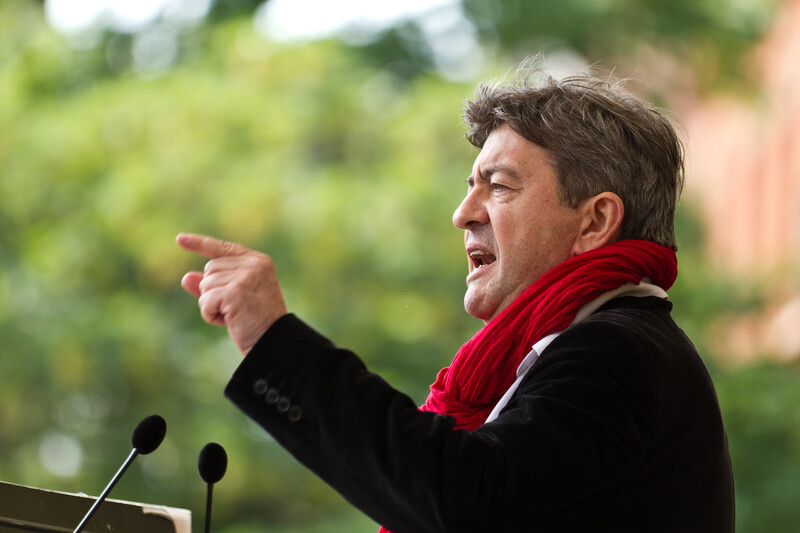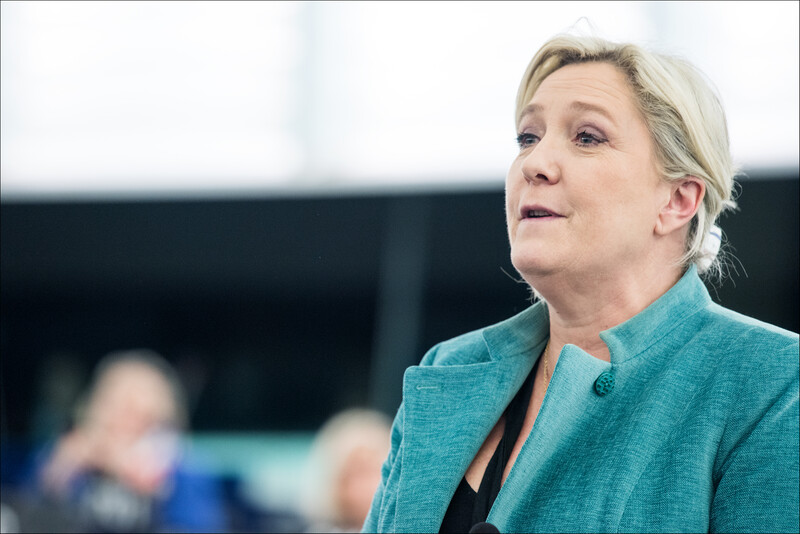What will France’s election mean for Palestine?
Power Suits 19 April 2017

Left-wing insurgent candidate for France’s presidency Jean-Luc Mélenchon says he would back sanctions on Israel. (Pierre-Selim)
On Sunday, voters in France will choose the two top candidates to face each other in a runoff election on 7 May and become the country’s next president.
The election is being closely watched amid the wave of right-wing, xenophobic populism sweeping a “developed” world that has seen middle class incomes and security decimated as inequality soars to the highest levels in half a century.
For the first time since the founding of the Fifth Republic in 1958, neither of the two main left and right parties is favored to make it into the second round, setting the stage for a realignment that one establishment observer calls “the coming French revolution.”
Instead, the two frontrunners are Marine Le Pen, leader of the far-right Front National, and Emmanuel Macron, a former minister under Socialist President François Hollande who is running as a mold-breaking independent “centrist.”
But in a sign of how much in flux things are, polls have shown a recent surge for left-wing, pro-Palestinian candidate Jean-Luc Mélenchon.
Mélenchon, who wants to pull France out of NATO, is calling for sanctions on Israel and an end to France’s crackdown on Palestine solidarity activists.
What does all this mean for Palestine?
Macron’s boycott hypocrisy

Independent centrist Emmanuel Macron says he supports boycotts against French companies that discriminate in hiring, but totally opposes them against Israel. (Mutualité Française )
Last week Macron gave an interview to Beur FM, a radio station that serves the large French community of North African ancestry.
He displayed incoherence and hostility to the movement for justice in Palestine.
Macron was forceful on the question of companies in France that racially discriminate against jobseekers. He promised that the government would publish the names of companies found to practice employment discrimination, explicitly so that the public could impose – and he used the word – boycotts to hold them accountable.
Minutes later, Macron was asked about the landmark UN report that found that Israel practices apartheid against the entire Palestinian people. He was also asked about Israel’s new law barring entry to supporters of the boycott, divestment and sanctions (BDS) movement for Palestinian rights.
He restated the French political establishment’s standard talking points opposing Israeli settlements and supporting a two-state solution and vowed to press on with France’s harsh repression of defenders of Palestinian human rights.
“The French state condemns BDS and all boycotts,” Macron said. “I must be clear that this will continue if I am elected president.”
For Macron it is perfectly fine to encourage a boycott in France of French companies, but illegitimate to boycott a foreign state that practices apartheid among countless other violations.
Macron’s opposition to the grassroots campaign for Palestinian freedom, equality and justice reflects an establishment position that is facing a serious legal challenge. This week, the European Court of Human Rights sent questions to the French government seeking explanations of its policies of prosecuting activists.
This is part of an appeal by a dozen French activists convicted of “inciting hatred” for peacefully urging supermarket shoppers not to purchase Israeli goods. The activists view their conviction as a violation of their freedom of expression.
Their position is bolstered even by the European Union, which last year recognized that advocating for boycotts that aim to hold Israel accountable for its violations of Palestinian rights is a fundamental democratic right across the 28-nation bloc.
Such glaring hypocrisy as Macron’s hardly heralds a new day in French politics or any change in the country’s pro-Israel policies.
Front National: anti-Semitism, Islamophobia, support for Israel

Marine Le Pen’s Front National brings together a toxic mix of Islamophobia, anti-Semitism and support for Israel. (European Parliament)
Marine Le Pen has spent years trying to detoxify the Front National, founded in 1972 by her notoriously anti-Semitic and estranged father Jean-Marie Le Pen.
Part of the strategy has been to deflect the party faithful’s traditional, but taboo, anti-Semitism into an Islamophobia that is ever more acceptable to mainstream French society.
But her recent comments denying the French state’s responsibility and complicity for the deportation of thousands of the country’s Jews to Nazi death camps served as a reminder of the reality that lurks behind the rebranding.
Unable to shake its well-earned reputation for anti-Semitism, the Front National has lately sought to silence doubts and criticisms by cozying up to Israel.
Aligning herself with mainstream political leaders, Le Pen has previously slammed the BDS movement in an effort to win favor with France’s Israel lobby.
In January, Nicolas Bay, the Front National’s secretary-general, visited Israel. Although the Israeli government officially boycotts the party, Bay secured meetings with senior officials, according to the Tel Aviv newspaper Haaretz.
In an effort to build bridges, Bay likened his party’s anti-immigrant, anti-Muslim platform to Israel’s policies. According to Haaretz, Bay’s message was that the Front National “is neither anti-Semitic nor racist, but merely wants to ensure the country’s security and preserve its identity, just like Israel or the Trump administration in America.”
This is reminiscent of US neo-Nazi leader Richard Spencer, who has described his vision of an Aryan homeland in part of North America as a form of “white Zionism.”
The Front National now even holds itself out as a protector of France’s Jews. But few are buying it.
“By saying they will protect the Jews against anti-Semitism, people understand that they mean they will be tough with the Muslims,” Jonathan Arfi, vice president of CRIF, France’s main Jewish communal organization and pro-Israel lobby group, told The New York Times this month. “Everything is between the lines.”
However Le Pen does at the ballot box, the prognosis is clear: she will continue to push the far-right themes promoted in Trump’s America – a toxic combination of racism, Islamophobia, anti-Semitism and extreme support and admiration for Israel.
Mélenchon calls for sanctions
If there is any bright spot for Palestine in France’s election, it is the rise of the insurgent left-wing candidate Jean-Luc Mélenchon.
Polls show him at around 20 percent, almost doubling his support over the last month. This puts him just behind Macron and Le Pen who are each hovering in the low twenties.
If Mélenchon manages to get into the runoff, he will bring with him a set of policies which – at least on paper – deviate from the French establishment’s solid pro-Israel consensus.
Like the others, Mélenchon backs the two-state solution, but pledges to immediately recognize Palestine as a state.
In a February letter to Palestine solidarity groups setting out his policies, Mélenchon’s campaign says he is ready to back sanctions against Israel over its settlements and the ongoing blockade of Gaza. This could include, he says, suspending the EU-Israel trade agreement.
And of great significance for the Palestine solidarity movement, he pledges to cancel the so-called Circulaire Alliot-Marie, the 2010 justice ministry memorandum instructing prosecutors to crack down on BDS activists.
François Fillon, the scandal-plagued candidate of the traditional right-wing Republicains is also at about 20 percent, while the candidate of President Hollande’s Socialist Party, Benoît Hamon, languishes at about 7.5 percent.
Given the upset results in last year’s US election and the UK’s Brexit referendum, it would be foolish to bet on the outcome in France with polls this close.
But Mélenchon’s surge shows that in France there is a strong progressive base ready to back Palestinian rights and hold Israel accountable. No matter what the result of the election, that is a solid foundation on which activists can continue to build.
No comments:
Post a Comment